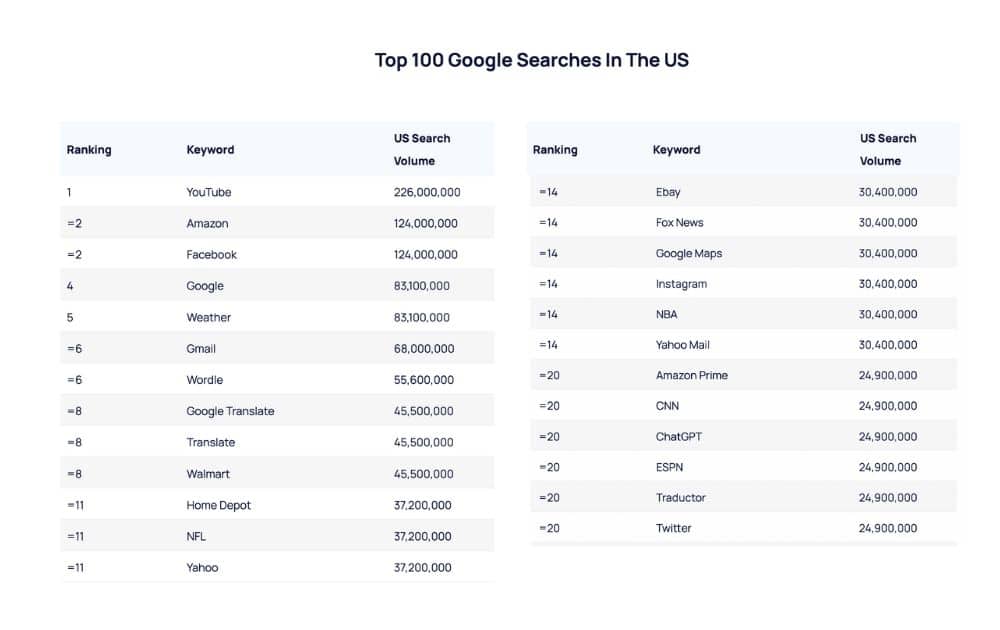As a consumer, have you ever Googled terms such as “Starbucks frappuccino” or “PlayStation 5?” If you answered yes, then you probably have an idea of the power of branded keywords.
As a seller, brand keywords offer a wealth of benefits―from gauging your reputation to boosting your competitor research.
Let’s explore the basics of these search terms and how they can help you step up your business. We’ll also tackle tips on how to manage them effectively.
What are Branded Keywords?
Branded keywords are search terms that include the brand’s name or a variation of it. These terms are closely tied to your business, as they attract users who are actively searching for your brand.
Let’s say someone searches for the term “Trader Joe’s cookie butter.” Trader Joe’s serves as the branded keyword, directly linking the search to the grocery store chain.
Data from Statista reveals that unbranded searches dominate consumer behavior across both global brands and small-to-medium-sized businesses (SMBs).

For SMBs learning about branded terms, this number highlights the importance of building strong brand recognition. It also highlights why it’s crucial to optimize for such keywords to capture the attention of consumers who search for products with a specific brand in mind.
Should You Target Branded Keywords?
Given the data above, which shows unbranded searches are prefered by consumers, is targeting branded keywords worth it? The short answer is yes.
After all, branded search terms represent a highly valuable segment of traffic. Here are a few benefits linked to targeting these keywords:
Higher Conversion Rates
Consumers who use brand keywords when searching are most possibly further along the sales funnel or customer journey. They already have a specific brand or product in mind, which means they are more likely to convert into paying customers.
This higher intent leads to better ROI on your marketing efforts.
Brand Protection
When you target relevant keywords, specifically your own brand keyword, you can prevent competitors from capitalizing on your brand’s name.
If you don’t bid on your own keywords, competitors might. This could lead to diverting high-intent traffic away from your site, resulting in lost sales and diluted brand presence.
Enhancing Loyalty
Here’s a peak at the top US Google searches in August 2024:

As seen from the top 20 keywords, almost all are examples of branded keywords, except for two terms: “weather” and “translate.”
When consumers consistently find your brand at the top of search results, it reinforces loyalty and recognition. Brand keywords ensure that consumers see the official and most relevant information from you, which can increase trust and engagement.
While non-brand keywords are essential for attracting new customers, brand keywords are crucial for converting existing interest into sales. You’ll also protect your reputation and reinforce customer loyalty.
Related content: Building an Amazon Brand Story
Types of Branded Keywords
Branded keywords come in various forms, each serving a specific purpose in your digital marketing strategy. Here are the main types:
Primary Keywords
Think of “Nike” or “Coca-cola.” These are the most straightforward type of branded search terms, since they directly include the brand name.
Primary branded terms capture search traffic from consumers specifically looking for your brand, making them crucial for recognition and direct conversions.
Product Keywords
These keywords combine the brand name with specific products or services. For example, “Apple Macbook Air” or “Nike Air Max.” Such terms are highly targeted and often used by consumers who are close to making a purchase decision. They reflect a strong intent to buy.
Campaign Keywords
These keywords are associated with specific marketing campaigns, promotions, or events tied to the brand.
To see how this works, I did a little experiment on Google Trends. I searched for “Starbucks Pumpkin Spice Latte” and “pumpkin spice latte.”

As seen on the chart, both keywords spike every year at around fall time. Though the non-brand keyword gets more search volume, the branded one stays consistent from year to year.
Here’s another interesting fact about the case study: Starbucks first offered pumpkin spice latte on its menu in 2003. The search term “pumpkin spice latte” started picking up in Fall 2005―the same time the search term “Starbucks Pumpkin Spice Latte” did.
In this case, it’s not a far-fetched assumption that the non-brand keyword grew popular because of Starbucks’ menu offering.
Navigational Keywords
These are keywords that users type in when they are looking to navigate directly to a brand’s website, like “Amazon login” or “Microsoft support.”
Navigational keywords are essential for ensuring that users find the correct and official page, especially in scenarios where competitors might bid on similar terms.
Informational Keywords
These keywords include the brand name along with words that indicate the user is seeking information about the brand, such as “Tesla reviews” or “Lush sustainability practices.”
Informational keywords are valuable for managing your brand’s online reputation and providing consumers with the intel they need to make informed decisions.
Comparison Keywords
These keywords involve comparisons between your brand and competitors, such as “Coke vs Pepsi” or “iPhone vs Samsung.” They capture users who are in the evaluation stage of their purchase journey, making them critical for influencing consumer decisions at a pivotal moment.
Related content: Product & Category Targeting
Branded Keywords vs. Non-Branded Keywords
Bidding on both search terms offers different but complementary roles. Let’s pit the two against each other in terms of search intent, conversion rates, and how they contribute to brand loyalty.
Branded Keywords
These keywords typically attract users who are already familiar with your brand. Such consumers are either seeking more information or ready to make a purchase.
- Intent. Users searching with branded search terms are often further along in their customer journey. They might be looking to buy a product, visit your website directly, or find specific information about your brand.
- Conversion Rates. Because these users already have a specific brand in mind, brand keywords usually have higher conversion rates. They capture highly targeted traffic, leading to more efficient marketing spend.
- Brand Loyalty. Brand keywords help reinforce consumer loyalty, ensuring that users who are searching for your brand can easily find your official content rather than being redirected to a competitor’s site.
June 2024 data shows that brand keywords mostly outranked non-brand keywords in terms of click-through rates (CTR):

Non-Branded Keywords
When consumers are at the start of their search for a product or service, they start with these search terms. There are typically keywords without a predetermined brand in mind.
- Intent. Non-brand keywords typically attract a broader audience that might be researching products, seeking general information, or comparing options. These users are often in the awareness or consideration stage of the buying process.
- Conversion Rates. Although non-brand keywords can drive a large volume of traffic, the conversion rates tend to be lower because these users are not yet committed to a particular brand. However, they are crucial for expanding your reach and attracting new customers.
- Brand Awareness. Non-brand keywords are essential for capturing a wide audience and building brand awareness. They allow you to introduce your brand to potential customers who might not have been aware of it before their search.
Tips for Managing Branded Keywords
Here are a few tips to manage branded keywords successfully:
- Regularly monitor the performance of your keywords―branded or not―to spot trends and possible changes in shopping behavior. This will allow you to adjust your strategies as needed to ensure that your brand remains visible and competitive.
- Optimize your search terms by ensuring that your keywords are used consistently across all your digital content. These include your website copy, product descriptions and meta tags. By optimizing these terms, you enhance your brand’s visibility and improve your chances of ranking higher in search engine results.
- Conducting keyword research on Amazon and other platforms can provide valuable insights into how your keywords are performing in comparison to non-branded terms. This research helps you understand what your customers are searching for, and allows you to tailor your keyword strategy to meet their needs more effectively.
- Target your ASINs with brand keywords. This practice ensures that when customers search for your brand or products, your listings are prominently displayed, leading to increased sales and improved brand visibility.
The Lowdown
Branded keywords ensure that you remain visible and accessible to users who already know and trust you.
Non-brand keywords, on the other hand, help you attract new audiences, increase awareness, and drive traffic from users in the early stages of their customer journey.
Both keyword types are crucial as you optimize your search terms, boost your SEO strategy and drive better conversion rates.
If you need help with search terms and other aspects of your Amazon business, AMZ Advisers can help. This Amazon seller consultant agency helps brands grow across the US, Europe, Canada, and Asia, allowing them to achieve their full potential.
Author




